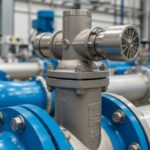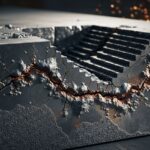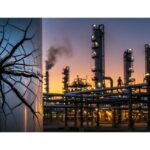Introduction
Polyvinyl chloride, commonly known as PVC, has become a vital material in plumbing and piping systems. Its combination of durability, cost-effectiveness, and resistance to corrosion has made it the go-to option for numerous applications, from residential plumbing to industrial and municipal systems. PVC pipes are valued not just for their economic advantages but also for their high performance in handling a variety of fluids under various conditions.
This article delves into the comprehensive characteristics of PVC pipes, including their composition, applications, and technical factors. By the end, you’ll have a clear understanding of why PVC is widely regarded as one of the most reliable piping materials.
- Introduction
- What is PVC?
- Quiz on PVC pipes
- Composition of PVC
- Key Features of PVC Pipes
- Types of PVC Pipes and Their Applications
- PVC Pipe Sizes and Pressure Ratings
- Factors to Consider When Selecting PVC Pipes
- Installation Guidelines for PVC Pipes
- Advantages of Using PVC Pipes
- Disadvantages of Using PVC Pipes
- Comparison of PVC with Other Pipe Materials
- Frequently Asked Questions (FAQs)
What is PVC?
PVC (Polyvinyl Chloride) is a synthetic plastic polymer that is used in a wide variety of applications, particularly in the construction industry. Its inherent chemical resistance, strength, and low cost have made it one of the most popular materials for pipes. Unlike other plastics, PVC does not contain plasticizers, which enhances its durability and makes it safer for water service applications where maintaining the purity of potable water is crucial.
Quiz on PVC pipes
1. What is the primary material used to make PVC pipes?
Choose the correct answer:
Correct Answer: C) Polyvinyl Chloride
Explanation: PVC stands for Polyvinyl Chloride, which is a synthetic plastic polymer widely used for manufacturing pipes due to its durability, chemical resistance, and cost-effectiveness.
2. What is one of the key benefits of using PVC pipes over metal pipes?
Choose the correct answer:
Correct Answer: C) PVC pipes are resistant to corrosion
Explanation: One of the key advantages of PVC pipes is that they do not corrode, unlike metal pipes, making them a better long-term option for plumbing systems, especially in environments prone to moisture and chemicals.
3. What characteristic of PVC makes it ideal for plumbing systems that transport hot fluids?
Choose the correct answer:
Correct Answer: B) Low thermal conductivity
Explanation: PVC has low thermal conductivity, meaning it doesn’t transfer heat easily, which makes it more energy-efficient and safer for transporting hot fluids in plumbing systems.
4. Why is PVC considered environmentally friendly in comparison to metal pipes?
Choose the correct answer:
Correct Answer: A) It requires less energy to produce and is recyclable
Explanation: PVC is considered environmentally friendly because it requires less energy to manufacture compared to metal pipes. Additionally, PVC can be recycled, which reduces waste and conserves resources.
5. What makes PVC pipes cost-effective in industrial and residential applications?
Choose the correct answer:
Correct Answer: C) They are lightweight, durable, and inexpensive
Explanation: PVC pipes are a cost-effective solution because they are lightweight, reducing transportation and installation costs. Additionally, their durability and resistance to corrosion minimize the need for frequent maintenance, making them an economical choice for various applications.
Complete Course on Piping Engineering
Basics, Codes & Standards, Layout, Materials & Stress Analysis
Composition of PVC
PVC is made by polymerizing vinyl chloride, a chemical compound. This process results in a durable, lightweight, and flexible material that is ideal for a range of uses. Here are some key characteristics of PVC:
- Corrosion-resistant: Unlike metal pipes, PVC does not corrode, which significantly extends its lifespan.
- Non-toxic: PVC pipes are free from harmful additives that could leach into water supplies, making them safe for potable water distribution.
- Chemical resistance: It is resistant to a broad range of chemicals, which is crucial for industrial applications.
- Low thermal conductivity: PVC does not conduct heat well, which makes it an energy-efficient option for plumbing systems.
Key Features of PVC Pipes
PVC pipes stand out for a variety of reasons, making them suitable for different applications. Here are the major features of PVC pipes that make them a top choice in the piping industry:
- Durability
PVC pipes have a long lifespan, often lasting over 50 years when properly installed and maintained. Their corrosion-resistant nature prevents the wear and tear typically seen in metal pipes. - Cost-effective
PVC is one of the most economical piping materials available today. It offers a cheaper alternative to other materials like copper and steel while delivering excellent performance. - Chemical resistance
PVC pipes are resistant to chemicals commonly found in sewage, water supply, and industrial environments, which makes them versatile for multiple applications. - Lightweight
PVC pipes are light, which reduces transportation and installation costs. It also minimizes the labor needed for installation. - Environmentally friendly
PVC pipes have a low environmental impact, as they require less energy to produce compared to metal pipes, and they are recyclable.
Types of PVC Pipes and Their Applications
There are different types of PVC pipes, each color-coded to denote specific applications. Understanding these types helps in selecting the right pipe for each specific need.
1. Standard White PVC (Cold Water Distribution)
White PVC pipes are predominantly used for cold water distribution, drainage, and venting systems in residential settings. They are commonly referred to as soil pipes and are perfect for waste and vent applications due to their durability and ease of installation.
- Applications:
- Residential plumbing
- Drain, Waste, and Vent (DWV) systems
- Cold water supply
2. Blue PVC (Cold Water Service)
Blue PVC pipes are specifically designed for cold water service. These pipes are widely employed in municipal water systems and are also used in some industrial applications.
- Applications:
- Municipal water supply
- Cold water distribution for industrial systems
3. Dark Gray PVC (Industrial Cold Water)
The dark gray PVC pipe is optimized for industrial-grade cold water service. Its composition is resistant to chemicals, making it suitable for more severe industrial environments, where standard white PVC might not perform as well.
- Applications:
- Industrial plumbing
- Chemical transport systems
- Cold water applications in industrial settings
4. Green PVC (Sewer Systems)
Green PVC pipes are used for sewer applications and are specifically designed to withstand the pressure and conditions present in wastewater transport. They are thicker and more robust than regular PVC pipes.
- Applications:
- Sewage transport
- Wastewater systems
- Drainage systems
PVC Pipe Sizes and Pressure Ratings
PVC pipes come in various sizes, measured in diameter, and their pressure ratings depend on the specific application and the operating temperature. The higher the temperature, the lower the pipe’s pressure rating due to PVC’s sensitivity to heat.
| Pipe Size (NPS) | Pressure Rating at 20°C (psi) | Pressure Rating at 40°C (psi) | Pressure Rating at 60°C (psi) |
|---|---|---|---|
| ½ inch | 450 | 315 | 200 |
| 1 inch | 450 | 315 | 200 |
| 2 inches | 400 | 280 | 175 |
| 4 inches | 370 | 260 | 160 |
The table above illustrates the pressure ratings for PVC pipes at various sizes and temperatures. Always refer to the operating temperature and de-rating factor chart for accurate pipe selection.
Factors to Consider When Selecting PVC Pipes
When choosing the right PVC pipe for a project, various factors should be considered to ensure optimal performance.
- Operating Pressure
Ensure that the PVC pipe’s pressure rating matches the system’s operating pressure to prevent any structural failures. - Temperature
High temperatures weaken PVC pipes, so it’s important to select a pipe that can withstand the maximum temperature in your system. - Chemical Compatibility
For industrial applications, always check that the PVC pipe material is compatible with the chemicals that will be transported. - Installation Conditions
Environmental factors such as UV exposure, soil conditions, and the presence of mechanical stress should be considered before selecting PVC pipes.
Installation Guidelines for PVC Pipes
Proper installation is crucial to ensuring the long-term performance of PVC pipes. Below are key steps to follow during installation:
- Cutting: Always use a fine-tooth saw to cut the pipe cleanly and squarely.
- Deburring: Remove any burrs from the pipe after cutting to ensure a clean fit.
- Fitting: Ensure the pipe and fittings are clean and dry before applying primer and solvent cement.
- Joining: Use a rotating motion to join the pipe and fitting, ensuring an even layer of cement around the connection.
- Curing: Allow the solvent cement to cure as per the manufacturer’s instructions before applying pressure.
Advantages of Using PVC Pipes
PVC pipes offer several advantages, making them a preferred choice in many industries.
- Cost-efficiency: PVC pipes are generally less expensive than alternatives such as copper or steel.
- Longevity: PVC pipes are highly durable and can last for decades without requiring replacement.
- Low maintenance: PVC requires little to no maintenance due to its resistance to corrosion and degradation.
- Chemical resistance: This makes PVC ideal for industrial applications where chemical exposure is a concern.
- Safe for potable water: PVC pipes are non-toxic and safe for use in drinking water systems.
Disadvantages of Using PVC Pipes
While PVC pipes are highly advantageous, they do have some limitations:
- Temperature sensitivity: PVC pipes lose strength as temperatures increase, making them unsuitable for high-temperature applications.
- Brittleness at low temperatures: PVC becomes more brittle and prone to cracking in extremely cold conditions.
- Potential for UV degradation: Prolonged exposure to sunlight can cause PVC to degrade, necessitating protective coatings or the use of UV-resistant PVC pipes.
Comparison of PVC with Other Pipe Materials
| Material | Cost | Durability | Corrosion Resistance | Temperature Tolerance | Installation Difficulty |
|---|---|---|---|---|---|
| PVC | Low | High | High | Low | Easy |
| Copper | High | High | Medium | High | Difficult |
| Steel | High | Medium | Low | High | Difficult |
| PEX | Low | High | High | Medium | Easy |
PVC compares favorably with other piping materials, especially in terms of cost, corrosion resistance, and ease of installation.
Frequently Asked Questions (FAQs)
1. What are the common uses of PVC pipes?
PVC pipes are used in residential plumbing, industrial applications, municipal water systems, and wastewater management.
2. Is PVC safe for drinking water?
Yes, PVC pipes are non-toxic and safe for transporting potable water.
3. What is the lifespan of PVC pipes?
PVC pipes can last 50 years or more with proper installation and maintenance.
4. Can PVC pipes handle hot water?
No, PVC pipes are not suitable for hot water applications as they lose strength at higher temperatures.
5. What is the difference between white and green PVC pipes?
White PVC is typically used for cold water and drainage, while green PVC is used for sewer and wastewater systems.
Popular courses by EPCLAND on Piping Engineering:
- Complete Course on Piping Engineering
- Piping Layout Engineering
- Piping Material Engineering
- Piping Stress Analysis
- All Courses Published on EPCLAND Platform
Top Short Courses on valves by EPCLAND:
- 14 Components of API 6A Gate Valve
- 14 Components of API 6D Valves
- 58 Components of API 602 Gate Valves
- 17 Components of API 600 Gate Valves
- Valve Material Specifications (VMS) – Comprehensive Guide
Important Links
- Video Series on Comparison of Piping Items: Check here
- Join Biggest Telegram Community of Piping Engineering: Click Here
- Subscribe YouTube channel: Click Here
- Check All Published courses: Click Here
- Read published technical Articles: Click Here
#Epcland #Pipingcourses #PIpingengineering #pipingonlinecourses #atulsingla







